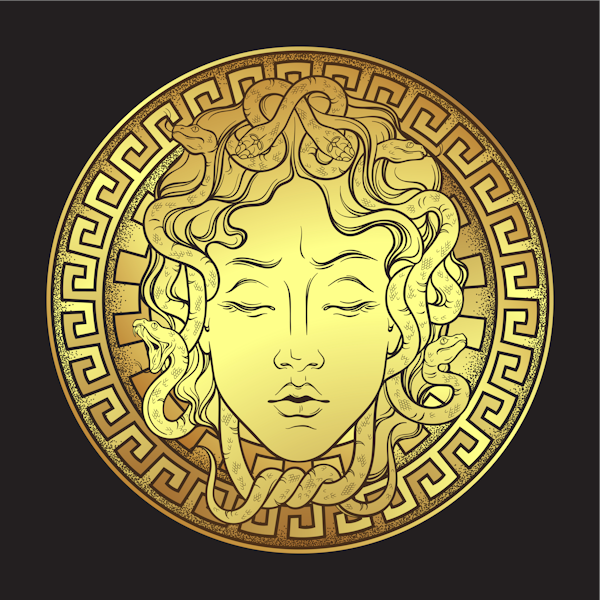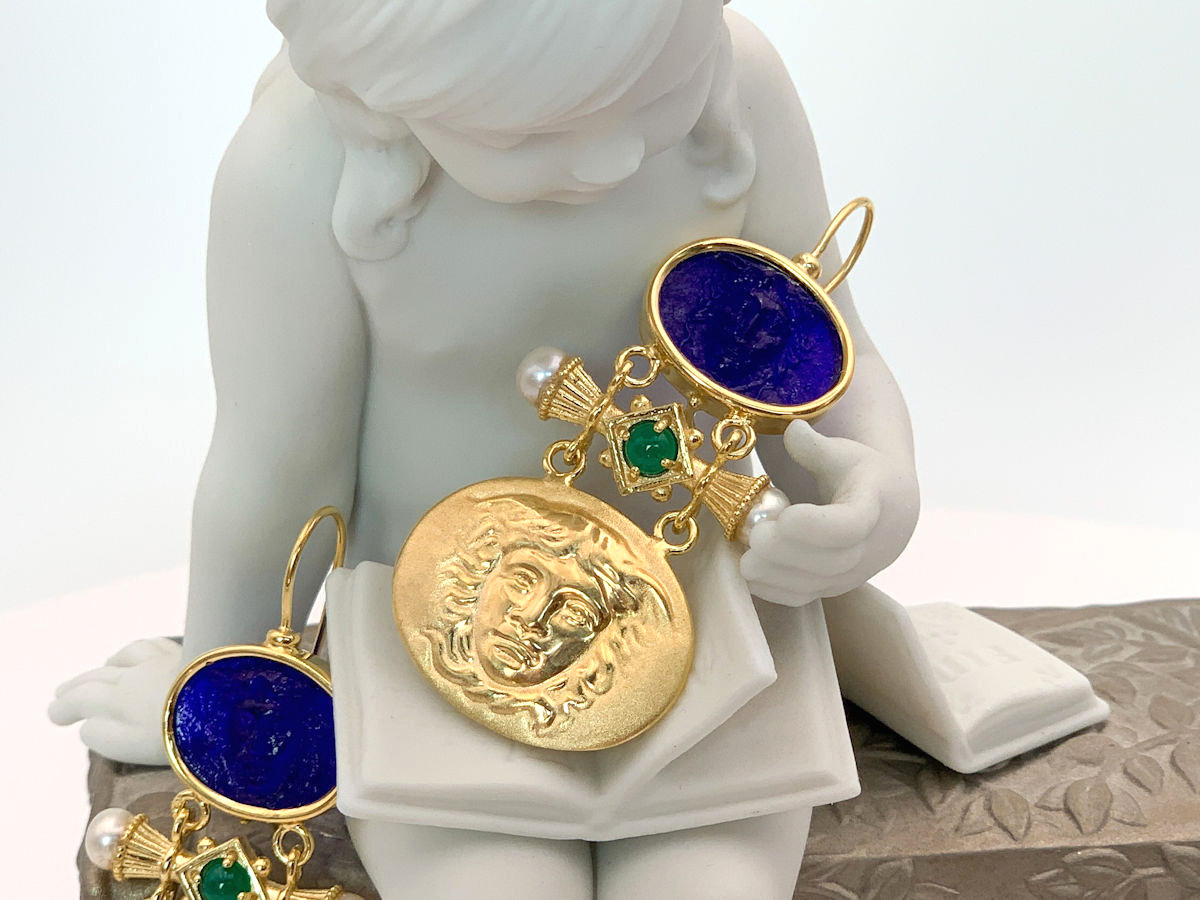Medusa: Member of the "#Me Too" Movement or Truly a Monster?
While tales of treacherous beauty are abundant in mythology, that of Medusa may be the most fearsome and the saddest. Many instantly recognize this gorgon by her tresses of snakes that instantly turn men to stone. She was constantly reviled and feared because of this condition, but did you know that Medusa started out as a regular mortal?
Medusa was once a beautiful young woman with a head of glorious hair, envied by most. She was a priestess of Minerva (Athena - goddess of wisdom and war). In pledging herself to the goddess, Medusa’s life was no longer her own. This meant that her life path was determined for her. One aspect of this service was that Minerva required that all of her priestesses maintain a vow of chastity. Therefore, Medusa could not have a family, a dream that many young women held. However, Neptune (Poseidon - god of the sea) instantly took notice of Medusa’s great beauty. With no thought of the consequences, Neptune seduced Medusa in the temple of Minerva. As anyone would expect, this greatly angered Minerva, leading her to curse Medusa. Instead of taking her vengeance out on Neptune, Minerva directed her wrath on Medusa only. In modern times, we would see this as "victim shaming." It is likely that Medusa would have been an early member of the "#Me Too" movement. The old adage that history is doomed to repeat itself seems to be true in this case. Have we made so little progress?
Minerva’s curse turned Medusa into one of the gorgons, winged creatures with snakes for hair. A gorgon’s gaze was so ferocious that it could turn men instantly into stone. One would think that such a curse was certainly penance enough. However, Minerva was not quite finished with Medusa.
Tagliamonte Venetian cameo jewelry represents an artistry from a bygone era filled with gods and goddesses, heroes and heroines, and the epic battle of good versus evil.. The Tagliamonte earrings below feature two unique three dimensional cameos of Medusa in her glory. They feature two types of cameos: one in a cobalt blue, oval Venetian glass with the image of Medusa and the other in gold plate depicting another face of Medusa. Wear these earrings and feel a grand sense of power!
Far away in Argos, King Acrisius had received bad news from the Oracle of Delphi. (A high priestess who gave cryptic predictions and guidance). She had told him that his daughter, Danae would bear a son who would one day cause his death. Locking his daughter up, he was certain he had ensured his own safety. Unbeknown to him, his plans were thwarted when Jupiter (Zeus - the king of the gods) appeared in a mist of gold. After this brief encounter, Danae becomes the mother of Perseus.
Greatly angered at this treachery, Acrisius locked Danae and Perseus in a great wooden chest, floating it out into the ocean to leave their fate in the hands of the gods. Zeus safely guided them to an island. However, their struggles were far from over.
After years of living on the island, King Polydectes noticed Danae’s beauty. Wanting her for himself, he repeatedly asked her to marry him, but he was refused each time. Unfamiliar with not getting his way, the king was furious. Determined to have her, he threatened that he would force her into the marriage. Perseus, coming to his mother’s aid, made the king realize that his threats were useless. Therefore, the king realized that he must get rid of Perseus. He told Perseus that if he were to bring back the head of Medusa he would leave them both alone. Perseus agreed. The king believed the task would be impossible for Perseus to accomplish and congratulated himself on his plans.
Being the son of Zeus, the gods were supportive of Perseus. Mercury (Hermes - the messenger god) gifted Perseus with his winged shoes, his helmet of invisibility, and a sword that would pierce the tough skin of the gorgon. Minerva also appeared to Perseus. With her own vendetta against Medusa, Minerva provided Perseus with a shield, a bag, and advice for him to go to the Graeae (the Gray sisters) who knew the location of the gorgons.
The Graeae were three old women who had one eye that they shared. Perseus flew to their cave using the winged sandals. There, he waited unseen under the helmet of invisibility for them to pass the eye between each other. Taking the eye from an outstretched hand, he offered them a deal to return the eye for the information he needed to get him to the island of the gorgons. They obliged grudgingly and told him where the island could be found.
Swiftly, Perseus flew to the island. There, he found statues of men who had been turned to stone with their own unsuccessful attempts of slaying the gorgons. Minerva had warned him that he would have to be cunning as one look from the gorgons would issue the same fate. She also warned him that the other two gorgons were immortal and could not be slain. Perseus carefully navigated the island in search of Medusa, using Minerva’s shield as a mirror to seek out her reflection. By a stroke of luck, he found her in the lair with her gorgon sisters asleep. He immediately struck off Medusa’s head. Before he could place it in his bag, he realized that from it had sprung a beautiful winged horse, later known as Pegasus, that flew off. This awakened the other gorgons, who were enraged at the death of their sister. Invisibly fleeing the island, Perseus traveled back to his mother.
Upon his arrival, the king was shocked to find Perseus still alive, having accomplished this feat. Taking Medusa’s head out of the bag, Perseus showed the king and his guards the spoils of his labor. With her gaze fixed on them, they turned into stone. He then returned the sword, helmet, and winged sandals to Mercury. When returning the shield to Athena, he offered her the head of Medusa as a gift. Medusa’s head was placed on her shield from then on, where it remained to ward off her foes.
Perseus is illustrative of the moral that it is always important to stand up for those you love. His love and loyalty to his mother allowed him to complete the task that he was given to slay Medusa. In doing so, he was also able to vanquish his mother’s captor, King Polydectes. However, it is hard to rejoice in Perseus’s victory as he was required to slay a victim of abusive male power. Throughout history, Medusa has been misjudged by humanity and only seen as a monster because few recall her origin story. It makes one wonder what her story could have been had she not been abused by a powerful man. If your opinion or view of Medusa has changed, "Say her name"...
Wearing Medusa’s likeness is thought to help in warding off evil and negativity. Medusa is a powerful representation of the indomitable female spirit. You will notice in many forms of art she faces forward and often stares out defiantly, an unusual trait when compared with her female contemporaries. Meanwhile, her son Pegasus represents mystery, inspiration, and the purity of freedom. Both of these figures ultimately capture the spirit of untamed beauty.
- Created on .
- Hits: 1832


